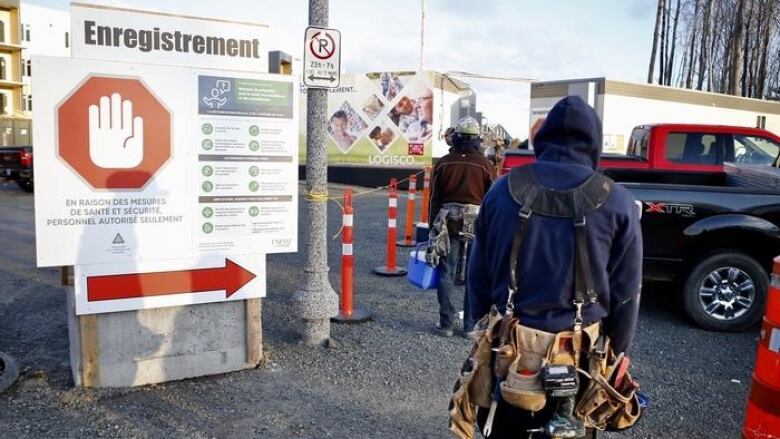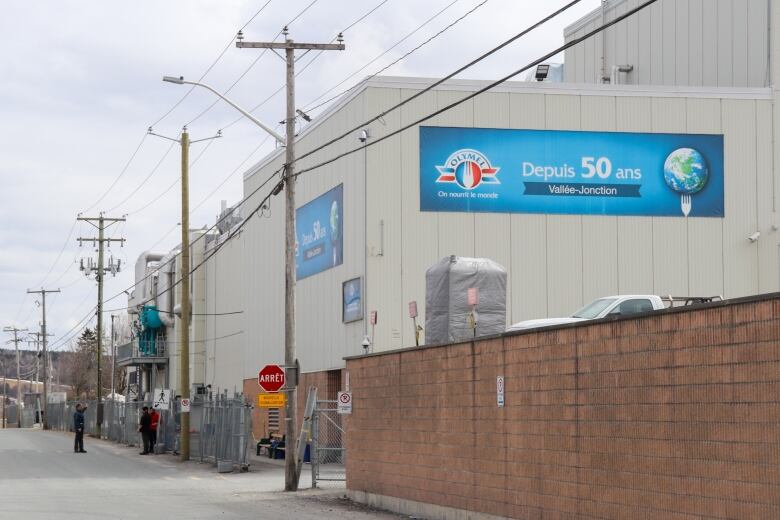In Quebec, the battle against COVID-19 shifts to workplaces
The province's public health director says just under half the current outbreaks are work-related

The coronavirus beganshowing up amongday-shift workers on Olymel'sbutchering floor in Valle-Jonction, 70 kilometres south of Quebec City,around Thanksgiving.
By last Saturday, the initial trickle had become a fast-moving current.
The company quickly arranged atesting blitz for 160 employees. By Wednesday night, union officials said, at least 60 had tested positive.
"We expect more in the coming days. The 20 who tested positive (Wednesday) don't have any symptoms. They were working on the floor next to other people who don't have their results yet," Martin Maurice, president of the Syndicat des travailleurs d'Olymel Valle-Jonction, said in an interview.
As the second COVID-19 wave gathers forcein Quebec, just under half the active outbreaks in the province have been traced back to workplaces: factories, construction sites, kitchens, hospitalsand the like.
That mattersbecause workplace infections areway stations for community spread, experts say.
The provincial public health director, Dr. Horacio Arruda, said on Thursday 46 per cent of all outbreaks involve a workplace. He also pointed out that, in most cases,the number of people affected is small, typically fewer than five.
That's the good news when it comes to stamping out localized infections.
But it provides little comfort when overburdenedpublic health authorities are forced to deal with scoresof flare-ups in geographically disparate areas. That iswhat'shappening.
According to Dr. Karl Weiss, a microbiologist and infectious disease specialist at the Universit de Montral, the second coronavirus wave is following a familiar autumn pattern, that of influenza.
Children spread the virus to each other at school, then to their parents, who take it to work. From there, it spreads into still older, more vulnerable populations.
"There is a spillover effect of the younger population into the older one," Weiss said in an interview. "This is what we are witnessing right now and hopefully we will be able to contain it as a society."
'Health first, then the rest comes after'
Premier Franois Legault knows the strict health measures could be the death knell for many restaurants, whose dining rooms have been closed all month,and that they've made him unpopular with the industry.
He told a news conference he has friends who own restaurants. Then he checked himself and half-jokingly said:"I should almost say: I used to have friends who owned restaurants."
He may also be making a few more former friends in the province's largest city.
In September, Montreal Mayor Valrie Plante and the city's Chamber of Commerce issued a joint plea for the provincial government to make it easier for office workers to return to their cubicles.
On Thursday morning, Plante unveiled a new plan to attract shoppers and kickstart her city's beleaguered downtown.
A few hours later, Legault said this: "it's health first, then the rest comes after."
For good measure, he said "all those who can work from home must work from home. I know the the Montreal Chamber of Commerce isn't going to like hearing me say that ... but what I'm telling you is we need even more people to work from home."
The rationale is fairly straightforward. In August and September, social gatherings were one of the pandemic's key drivers. Now, it appears workplaces have supplanted parties.
By their own admission, the workers at Olymel's factory in Valle-Jonctionhave been a little less careful lately than they were during the spring and even summer.
There'sgreater proximity in the lunchroom, more chatting between shifts, perhaps even a little social time outside working hours. Peoplewho work together have a way of becoming friends, in the Beauce and everywhere else.
"There are things maybe we haven't always done that we probably should have done, but look, there's been more of a casual attitude all over Quebec," said Maurice.
The same goes for the company, which Maurice says relaxed overtime restrictions and limits on worker interactions during shift changes.
WATCH | Quebec premier says decision about what will reopen in red zones coming next week
Hospital workers are having trouble following the rules too
The problem is not limited to factory floors. Even hospital staff slip up from time to time.
Leaders at the Centre hospitalier universitaire de Qubec sent a memo to the institution's 15,000 workers cataloguing a number of incidents from a safety audit earlier this fall.
According to the document, which was obtained by Radio-Canada, they range from workers bringing extra chairs into meal rooms so they could sit closer together, to employees crowding into break areas, to people simply not following distancingmeasures.
As Legault and Arruda have repeatedly said, it's predictablethata population weary from months of social distancing and other public health measures might slack off.
And so, a reminder.
"All workplaces must reinforce their measures," Arruda said. "I think maybe we've forgotten them. And I'm here to tell you that at work, during lunch time, before work, after work, it's very easy to get within two metres."

A few 'recalcitrant people'
On Thursday, Arruda met with theprovince's workplace safety board(CNESST) to discuss "a large operationto raise awareness once again and, if necessary, to use coercive intervention."
A CNESST spokesperson said ithas conducted 12,297 COVID-related inspections provincewide since the spring, roughly one-quarter of which stemmed from complaints. The rest were targeted inspections.
Of the total, only 22resulted in formal citations.
"Generally I'd say co-operation has been excellent, but you're always going to find a few recalcitrant people," said Nicolas Bgin,who also indicated the CNESST was called in to Valle-Jonction on Tuesday.
The small bands of"recalcitrant people" may be a fact of life, but Legaulthad a message for them too: "think about the 20 additional people who died (Wednesday)."
In fact, aninvestigation is currently under way to establish whether one of Olymel's Valle-Jonction workers shouldbe added to that grim total.
Early Wednesday morning, longtime employee Alain Grenier, a 65-year-old who was described as a generous and beloved colleague, died in his sleep.
He had tested positive for COVID-19 the previous day.
with files from Benjamin Shingler and Susan Campbell













_(720p).jpg)


 OFFICIAL HD MUSIC VIDEO.jpg)
.jpg)



























































































